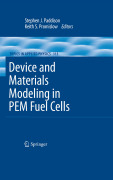
The impact of proton exchange membrane (PEM) fuel cells on energy generation will parallel the impact of the integrated circuit on information technology. The underlying processes in PEM fuel cells have strong tries to energy generation at the mitochondrial level in organic life. The potential applications range from the micron scale to large scale industrial production. Successful integrated of PEM fuel cells into the mass-market will require new materials and adeepening understanding of the balance required to maintain the various operational states. Key areas of development include electrocatalysts for the fuel and air electrodes and membranes exhibiting good proton conductivity under minimal hydration and temperatures between -20 to 120 °C. New materials possessing improved properties will emerge as a result of a collaborative effort between experimentalists, engineers, and theorists, the later doing both device and materials modeling. Utilizes multiscale approach to the chemical and physical phenomena of PEM fuel cells Contains both fundamental (i.e. materials) and applied research INDICE: From the contents Part I: Device Modeling: Modeling of PEMFC Catalyst Layer Performance and Degradation.- Catalyst Layer Operation in PEM Fuel Cells: From Structural Pictures to Tractable Models.- Reactor Dynamics of PEM Fuel Cells.- Coupled Proton and Water Transport in Polymer Electrolyte Membranes.- A Combination Model for Macroscopic Transport in Polymer-Electrolyte Membranes.- Analytical models of a polymer electrolyte fuel cell.- Phase change andHysteresis in PEMFCs.- Modeling of two-phase flow and catalytic reaction kinetics for DMFCs.- Thermal and Electrical Coupling in Stacks.- Part II: Materials Modeling: The Membrane. Water and Proton Transport w/ classical Molecular Dynamics. Modeling the State of the Water in Polymer Electrolyte Membranes. Proton Conduction in PEMs: Complexity, cooperativity, and connectivity. Atomistic structural modelling of ionomer membrane morphology. Quantum Molecular Dynamics Simulation of proton conducting materials.
- ISBN: 978-0-387-78690-2
- Editorial: Springer
- Encuadernacion: Cartoné
- Páginas: 310
- Fecha Publicación: 01/07/2008
- Nº Volúmenes: 1
- Idioma: Inglés
